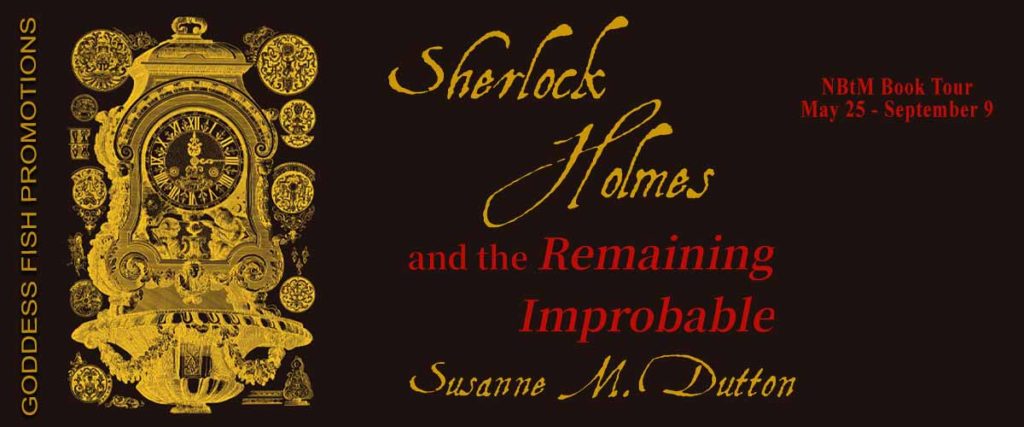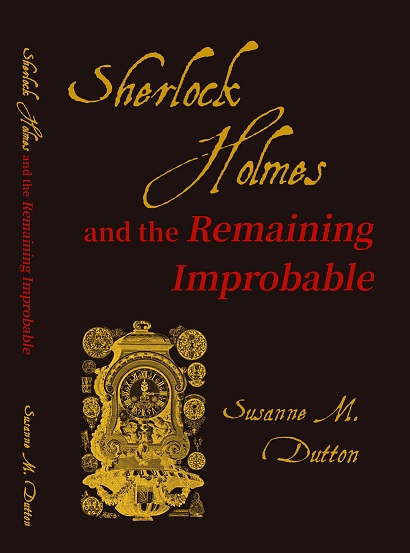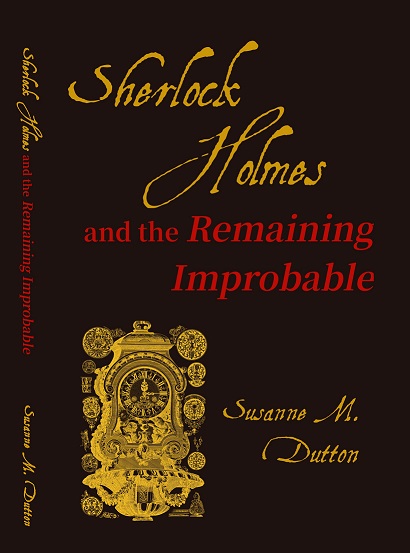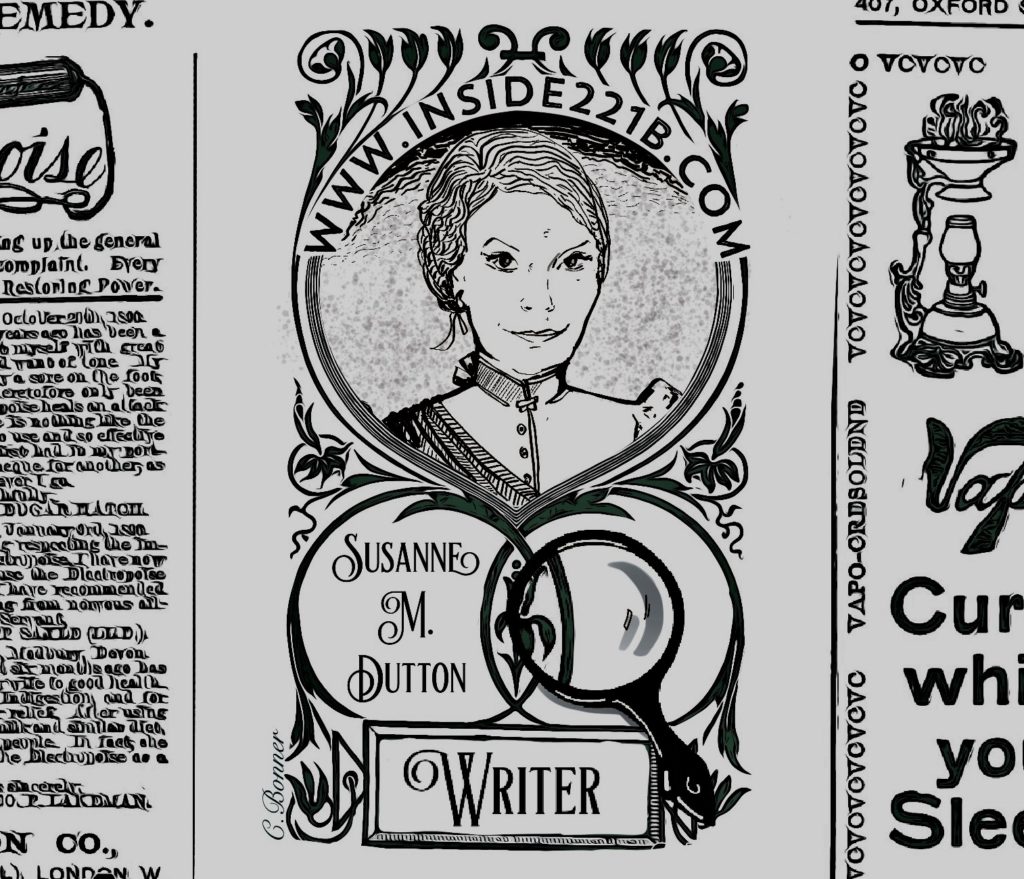
https://goddessfishpromotions.blogspot.com/2021/04/nbtm-sherlock-holmes-and-remaining.html
One randomly chosen winner via rafflecopter will win a $50 Amazon/BN.com gift card.
Author Interview: Susanne M. Dutton
What is your favorite ice cream flavor? Cherry Chocolate. That’s dark chocolate strewn with very, very maraschino cherries. This is an ice cream flavor that’s delicious when it’s hard and the cherries are chewy, but also good when it’s melted like a soupy dessert. Ginger snaps make good dippers.
Which mythological creature are you most like? Is there a mythological creature that observes? A Cyclops? No. How about an angel? I’m not angelic, but I am an observer. I have a print that shows an angel sitting on the roof of the beautiful Cathedral of Notre Dame in Paris, (now under careful reconstruction after a terrible fire). The angel seems solemn, but also entranced and intrigued by the world. I imagine many writers are good observers, not so much because they’ve developed a skill, but because they enjoy it. Maybe that’s the same thing.
First book you remember making an indelible impression on you. The Secret Garden. It must have touched something in me. Right now I have only a vague recollection of the plot, but there remains a strong sense of home when I think of the book. Of course, the thing to do is to reread it. I bet it could be an eye-opener about my little girl self, or little girls in general, as I know this is a classic favorite.
How do you develop your plot and characters? Each story begins with an image. A dream image works or a childhood recollection. Often, it’s an image that just floats into my head while listening to music. Sometimes it’s an actual scene that flashes by when I take the train or subway. Once I heard a man and woman in a pub exchange a few words that evoked a strange and funny image around which a story grew. I write about the image and the characters associated with it as it sits in my imagination. Then I write what leads up to the image and what grows out of it. I am often surprised about what occurs to me, but I put events or characters in even if later they need to be altered or taken out entirely. I am good at “killing my darlings,” getting rid of things that don’t work. I have a whole file of darlings, not dead—but waiting for the day I might give them a try out in another story. I know this sounds like the least efficient approach possible. Once I get going, I do make diagrams and maps and ask myself questions about what’s behind a character’s activities.
Describe your writing space. Picture a room that was used as a roomy closet by the last people who owned this old house. I can imagine it was also once a nursery. Hardwood floors with beige and light brown vertical striped wallpaper make it nest-like, even in this last frigid winter. My desk is old, once white-painted, and now turned to a mellow ivory color. My desk chair is an old slipper chair that supports my back and keeps my feet flat. I’ve put a brown suede chair between one of the two windows and a bookcase. Over the desk, there’s a peculiar print of what looks like a Victorian puritan minister ice-skating by himself in his frockcoat, black brimmed hat, and white neckcloth. I love this guy! He’s so prim, his face serious, and yet you know he’s skating just because it’s such fun. Other wall hangings are a small owl, an Edward Gorey print, and a sketch of writer Anthony Trollope in his glasses, staring down with both hands tucked in vest pockets.
Sherlock Holmes and the Remaining Improbable
by Susanne M. Dutton
~~~~~~~~~~~~~
GENRE: Mystery
~~~~~~~~~~~~~
BLURB:
The game is not afoot. The Better-Every-Day world of 1895 is gone, even hard to recall as WWI ends. From his rural cottage, Holmes no longer provokes Scotland Yard’s envy or his landlady’s impatience, but neither is he content with the study of bees. August 1920 finds him filling out entry papers at a nearly defunct psychiatric clinic on the Normandy coast. England’s new Dangerous Drugs Act declares his cocaine use illegal and he aims to quit entirely. Confronted by a question as to his “treatment goal,” Holmes hesitates, aware that his real goal far exceeds the capacity of any clinic. His scribbled response, “no more solutions, but one true resolution,” seems more a vow than a goal to his psychiatrist, Pierre Joubert. The doctor is right. Like a tiny explosion unaccountably shifting a far-reaching landscape, the simple words churn desperate action and interlocking mystery into the lives of Holmes’ friends and enemies both.
~~~~~~~~~~~~~
Excerpt:
Watson speaks:
“For God’s sake, then, I must be the one to venture out to him! I know Holmes like no one else. He will not be surprised, or at least not angered, to see me here. He will be relieved. You must trust me on this.”
Joubert’s shook his head. “That was my plan. Just so, mon ami. That is exactly what I believed, and why I sent for you, John. But my speculation did not extend to this.” He gestured toward the windows. The only remaining piece of window glass, a shard big enough to slice off a foot, fell and shattered on the brick floor. I granted myself a sideways glance at Joubert as we both put our chins down and covered our heads again.
An uneasy suspicion took root in my mind, only a seed at first, but an idea that sprouted quickly. If Holmes was angry with this Joubert, then Holmes had reason to be. The detective, as I knew him, was disinclined to speak of his family. It was not impossible that a sister existed or had existed, though I had not seen one in the genealogy upstairs.
Further, how was I to know that the man next to me in the dark was truly the Pierre Joubert of high repute? Even if Holmes had returned to the cocaine, hadn’t I better treat this fellow’s explanations with wariness? Holmes’ addiction had never before affected his ability to adjudge good and evil. Unerringly, Sherlock Holmes recognized the enemy of the just.
~~~~~~~~~~~~~
AUTHOR Bio and Links:
Susanne Dutton is the one who hid during high school gym, produced an alternative newspaper, and exchanged notes in Tolkien’s Elfish language with her few friends. While earning her B.A. in English, she drove a shabby Ford Falcon with a changing array of homemade bumper strips: Art for Art’s Sake, Forgive Us Our Trespasses, Free Bosie from the Scorn of History. Later, her interests in myth and depth psychology led to graduate and postgraduate degrees in counseling.
Nowadays, having outlived her mortgage and her professional counseling life, she aims herself at her desk most days; where she tangles with whatever story she can’t get out of her head. Those stories tend to seat readers within pinching distance of her characters, who, like most of us, slide at times from real life to fantasy and back. A man with Alzheimer’s sets out alone for his childhood home. A girl realizes she’s happier throwing away her meals than eating them. A woman burgles her neighbors in order to stay in the neighborhood.
Born in Des Moines, Iowa, Susanne grew up in the SF Bay Area, has two grown children, and lives with her husband in an old Philadelphia house, built of the stones dug from the ground where it sits.
Blog https://www.inside221b.com
Facebook https://www.facebook/noguessing.com (Improbable Holmes)
Publisher bookstore link to book:
~~~~~~~~~~~~~



Happy to read any Sherlock Holmes related stories.
Hi Mary! Me, too. If you do look for mine on Amazon or the Propertius site, note that my name is “Susanne,” not Suzanne. Thank you for your comment. Susanne
I meant to ask you, Mary: What’s your favorite? Susanne
Thank you for hosting today!
I liked the excerpt.
Hi Rita. Thank you for participating. If you have questions about mysteries, Holmes, or my thoughts on writing, let me know. Susanne
I love the cover and the book sounds good.
Hi Sherry. I contributed an idea for the cover. Propertius Press did all the rest. Thank you. Susanne
Happy Friday, Thanks for sharing :)!
Hello Victoria. Thank you for participating. Make the weekend count! Best wishes. Susanne